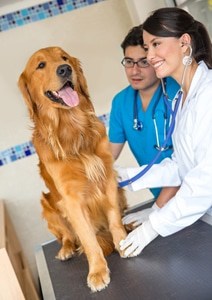 When it comes to finding a veterinary approach for treating various types of animals, there’s been a gradual shift in focus pertaining to more alternative forms of therapy. Specifically speaking, the practice of what’s known as holistic veterinary medicine has been gaining more advocacy as a potential treatment source for animals of late. The main philosophy in this practice tends to avoid focusing on more drug-based intervention in favor for more natural, less invasive techniques to soothe areas of discomfort. The leader in this veterinarian movement is the American Holistic Veterinary Medical Association, an organization that describes its mission statement to be to “advance and educate in the science and art of holistic veterinary medicine.”1 Those who are enrolled in veterinary technology programs curious in learning more about this latest trend of alternative practice should read on to find out more about holistic veterinary medicine: Defining holistic The term “holistic” itself when related to veterinary tactics generally refers to trying to be as minimally intrusive as possible when it comes to treating various ailments within an animal. The primary advantages those who practice this strategy hope to convey is that through less intervention involving technology or medicine, the more effective and cost-friendly this type of technique will be toward comforting an animal. Much of what holistic veterinary medicine focuses on is mental health, using more therapeutic philosophies that pertain to creating soothing environments, while taking into account other factors such as nutrition, owner relationships and stress levels when it comes to diagnosing a problem. The drift away from more conventional and scientific practices adopted by the veterinary community is primarily why holistic veterinary medicine remains relatively unknown to the general public. However, in recent years, the American Holistic Veterinary Medical Association has grown to more than 1,000 members, while also has been recognized as an affiliate with the American Veterinary Medical Association House of Delegates.2 Types of alternative practices When reviewing all the assortments of alternative veterinary practices, many of the techniques and therapies stem from programs used for treating humans. Some of these include methods such as acupuncture, aromatherapy, herbal medicines, nutritional therapies and more. There are many strategies that are taking straight from the rehabilitation techniques used for people. For instance, animals with mobility issues may be taken in for certain types of physical therapy, which usually entails everything from general stretching, water aerobics to treadmill sessions. While some of these procedures are used for specific ailments, such as acupuncture for treating arthritis in animals, others are used simply as a means for creating a more tranquil and relaxing environment to ease stress in pets. Sometimes, a combination of these alternative therapies and more conventional practices is used by holistic veterinarians, simply as a way to decrease the amount of blood tests, X-rays or methods of diagnosis that could be interpreted as more invasive. Identification from the AVMA The AVMA officially describes alternative veterinary practices as “Complementary and Alternative Veterinary Medicine.” While the AVMA has recognized these types of therapeutic methods for usage, they have still implemented various guidelines that call for appropriate evaluation of each alternative procedure, insisting that programs dedicated to promoting CAVM practices need to demonstrate “a substantial body of scientific knowledge.”3 However, the AVMA still acknowledges that it’s at the owner’s discretion that these alternative and holistic practices be carried out on their animal. AHVMA Annual Conference From October 17-20, Augusta, Georgia will be the site for the 2015 AHVMA Annual Conference,4 a gathering intended on bringing together the minds of veterinary professionals who support holistic veterinary medicine. This is a chance for those in attendance to learn more about the leading research that supports various alternative methods toward treating animals, such as chiropractic intervention or how crucial the role of nutrition plays in animal rehabilitation. A number of the guest speakers have already been confirmed for the event, including doctors with keynote topics such as “Evolution Meets Technology: Pet Food at Its Best” and “Ozone & Ultraviolet: Essential for Every Practice.” Anyone enrolled in veterinary technology school interested in obtaining more information regarding this medical approach should consider a trip to Augusta this fall. Finding a holistic veterinarian It’s important to note that many of these types of therapeutic practices won’t be recommended or used by general veterinarians. However, if you’re interested in seeing whether these strategies can potentially benefit your animal, you can always search for holistic-friendly veterinarians in your area. The AVHMA has a search database of listings for holistic-friendly veterinarians, so you can always look it over to see if there are any practitioners near you. Always discuss with your usual veterinarian about the effectiveness holistic practices may have upon your animal before seeking them out. 1 http://www.ahvma.org/organization/ 2 https://www.avma.org/About/Governance/Pages/AVMA-Governance-Organizations-Represented-in-AVMA-House-of-Delegates.aspx 3 “AVMA Guidelines for Complementary and Alternative Veterinary Medicine,” https://www.avma.org/About/Governance/Documents/2014W_2013W_Resolution3_Attch2.pdf 4 “2015 AHVMA Annual Conference — Breakfast Meetings,” March 29, 2015, http://www.ahvma.org/2015-ahvma-annual-conference-breakfast-meetings/#more-1238
When it comes to finding a veterinary approach for treating various types of animals, there’s been a gradual shift in focus pertaining to more alternative forms of therapy. Specifically speaking, the practice of what’s known as holistic veterinary medicine has been gaining more advocacy as a potential treatment source for animals of late. The main philosophy in this practice tends to avoid focusing on more drug-based intervention in favor for more natural, less invasive techniques to soothe areas of discomfort. The leader in this veterinarian movement is the American Holistic Veterinary Medical Association, an organization that describes its mission statement to be to “advance and educate in the science and art of holistic veterinary medicine.”1 Those who are enrolled in veterinary technology programs curious in learning more about this latest trend of alternative practice should read on to find out more about holistic veterinary medicine: Defining holistic The term “holistic” itself when related to veterinary tactics generally refers to trying to be as minimally intrusive as possible when it comes to treating various ailments within an animal. The primary advantages those who practice this strategy hope to convey is that through less intervention involving technology or medicine, the more effective and cost-friendly this type of technique will be toward comforting an animal. Much of what holistic veterinary medicine focuses on is mental health, using more therapeutic philosophies that pertain to creating soothing environments, while taking into account other factors such as nutrition, owner relationships and stress levels when it comes to diagnosing a problem. The drift away from more conventional and scientific practices adopted by the veterinary community is primarily why holistic veterinary medicine remains relatively unknown to the general public. However, in recent years, the American Holistic Veterinary Medical Association has grown to more than 1,000 members, while also has been recognized as an affiliate with the American Veterinary Medical Association House of Delegates.2 Types of alternative practices When reviewing all the assortments of alternative veterinary practices, many of the techniques and therapies stem from programs used for treating humans. Some of these include methods such as acupuncture, aromatherapy, herbal medicines, nutritional therapies and more. There are many strategies that are taking straight from the rehabilitation techniques used for people. For instance, animals with mobility issues may be taken in for certain types of physical therapy, which usually entails everything from general stretching, water aerobics to treadmill sessions. While some of these procedures are used for specific ailments, such as acupuncture for treating arthritis in animals, others are used simply as a means for creating a more tranquil and relaxing environment to ease stress in pets. Sometimes, a combination of these alternative therapies and more conventional practices is used by holistic veterinarians, simply as a way to decrease the amount of blood tests, X-rays or methods of diagnosis that could be interpreted as more invasive. Identification from the AVMA The AVMA officially describes alternative veterinary practices as “Complementary and Alternative Veterinary Medicine.” While the AVMA has recognized these types of therapeutic methods for usage, they have still implemented various guidelines that call for appropriate evaluation of each alternative procedure, insisting that programs dedicated to promoting CAVM practices need to demonstrate “a substantial body of scientific knowledge.”3 However, the AVMA still acknowledges that it’s at the owner’s discretion that these alternative and holistic practices be carried out on their animal. AHVMA Annual Conference From October 17-20, Augusta, Georgia will be the site for the 2015 AHVMA Annual Conference,4 a gathering intended on bringing together the minds of veterinary professionals who support holistic veterinary medicine. This is a chance for those in attendance to learn more about the leading research that supports various alternative methods toward treating animals, such as chiropractic intervention or how crucial the role of nutrition plays in animal rehabilitation. A number of the guest speakers have already been confirmed for the event, including doctors with keynote topics such as “Evolution Meets Technology: Pet Food at Its Best” and “Ozone & Ultraviolet: Essential for Every Practice.” Anyone enrolled in veterinary technology school interested in obtaining more information regarding this medical approach should consider a trip to Augusta this fall. Finding a holistic veterinarian It’s important to note that many of these types of therapeutic practices won’t be recommended or used by general veterinarians. However, if you’re interested in seeing whether these strategies can potentially benefit your animal, you can always search for holistic-friendly veterinarians in your area. The AVHMA has a search database of listings for holistic-friendly veterinarians, so you can always look it over to see if there are any practitioners near you. Always discuss with your usual veterinarian about the effectiveness holistic practices may have upon your animal before seeking them out. 1 http://www.ahvma.org/organization/ 2 https://www.avma.org/About/Governance/Pages/AVMA-Governance-Organizations-Represented-in-AVMA-House-of-Delegates.aspx 3 “AVMA Guidelines for Complementary and Alternative Veterinary Medicine,” https://www.avma.org/About/Governance/Documents/2014W_2013W_Resolution3_Attch2.pdf 4 “2015 AHVMA Annual Conference — Breakfast Meetings,” March 29, 2015, http://www.ahvma.org/2015-ahvma-annual-conference-breakfast-meetings/#more-1238



